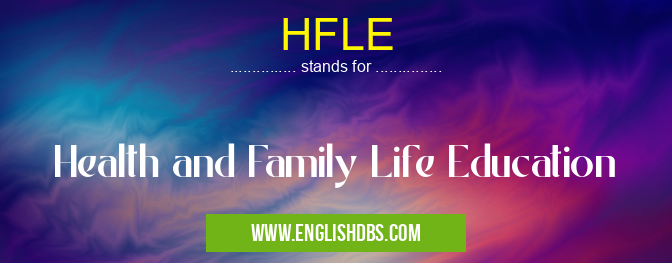What does HFLE mean in HEALTHCARE
Health and Family Life Education (HFLE) is an essential component of comprehensive education that addresses young people's health, well-being, and relationships. HFLE empowers individuals with the knowledge, skills, and values necessary to make healthy decisions throughout their lives.

HFLE meaning in Healthcare in Medical
HFLE mostly used in an acronym Healthcare in Category Medical that means Health and Family Life Education
Shorthand: HFLE,
Full Form: Health and Family Life Education
For more information of "Health and Family Life Education", see the section below.
» Medical » Healthcare
What does HFLE Stand for?
HFLE stands for:
- H: Health
- F: Family
- L: Life
- E: Education
Meaning of HFLE
HFLE is a holistic approach to education that integrates health, family, and life skills into the curriculum. It aims to:
- Promote health literacy: Equip individuals with the knowledge and understanding to make informed decisions about their health.
- Foster healthy relationships: Develop skills for building and maintaining healthy relationships with family, peers, and romantic partners.
- Promote responsible decision-making: Empower individuals to make choices that support their physical, mental, and emotional well-being.
- Address social determinants of health: Recognize and address factors that influence health outcomes, such as socioeconomic status, access to healthcare, and gender inequality.
Key Components of HFLE
HFLE typically covers topics including:
- Personal health: Physical, mental, and emotional health
- Nutrition: Healthy eating habits
- Physical activity: Importance of regular exercise
- Substance use: Prevention and consequences of substance abuse
- Reproductive health: Sex education, contraception, and pregnancy
- Gender equality: Healthy gender roles and relationships
- Peer pressure: Strategies for resisting negative peer influence
- Life skills: Communication, problem-solving, and decision-making
Essential Questions and Answers on Health and Family Life Education in "MEDICAL»HEALTHCARE"
What is HFLE?
HFLE stands for Health and Family Life Education. It is a comprehensive educational approach that provides young people with the knowledge, skills, and values they need to make healthy decisions about their sexual and reproductive health.
Why is HFLE important?
HFLE is important because it helps young people develop the skills and knowledge they need to protect their health and well-being. It can help them to understand their bodies, make informed decisions about their sexual and reproductive lives, and build healthy relationships.
What are the benefits of HFLE?
HFLE has a number of benefits for young people, including:
- Increased knowledge about sexual and reproductive health -Improved decision-making skills -Reduced risk of sexually transmitted infections (STIs) and unintended pregnancy -Increased self-esteem and body confidence -Improved communication skills -Enhanced ability to build healthy relationships
What does HFLE typically cover?
HFLE typically covers a wide range of topics, including:
- Human anatomy and physiology
- Sexual development and reproduction
- Relationships and sexual behavior
- Contraception and STI prevention
- Decision-making and critical thinking skills
- Communication skills
- Values clarification
Who provides HFLE?
HFLE is typically provided by schools, community organizations, and healthcare providers. Schools are often the primary setting for HFLE, but other organizations can also play an important role in providing this education.
What are some of the challenges to providing HFLE?
There are a number of challenges to providing HFLE, including:
- Lack of funding
- Lack of trained teachers
- Cultural and religious barriers
- Resistance from parents and community members
Final Words: HFLE is a vital part of education that provides young people with the tools and knowledge they need to live healthy and fulfilling lives. By fostering health literacy, promoting healthy relationships, and empowering individuals to make responsible decisions, HFLE contributes to the overall well-being and development of society.
